专题12 一般将来时(课件)-2024年小升初英语复习讲练测(全国通用版)(共21张PPT)
文档属性
| 名称 | 专题12 一般将来时(课件)-2024年小升初英语复习讲练测(全国通用版)(共21张PPT) |  | |
| 格式 | pptx | ||
| 文件大小 | 33.2MB | ||
| 资源类型 | 试卷 | ||
| 版本资源 | 通用版 | ||
| 科目 | 英语 | ||
| 更新时间 | 2024-06-17 18:24:30 | ||
图片预览

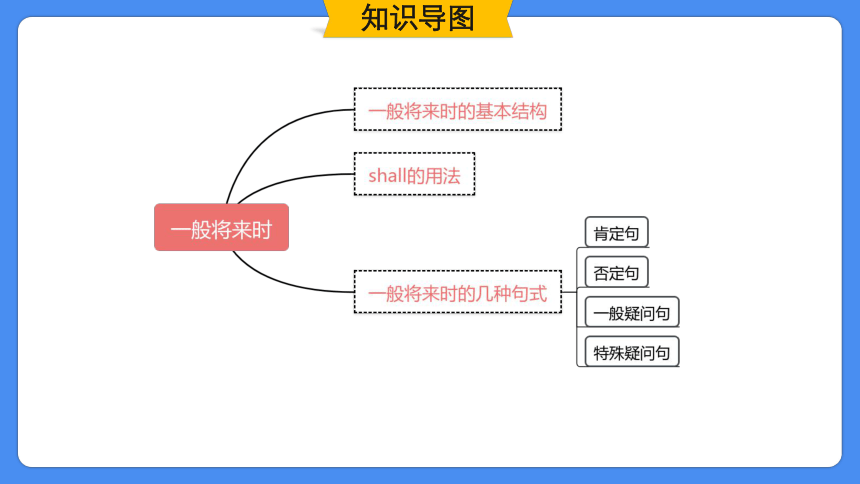
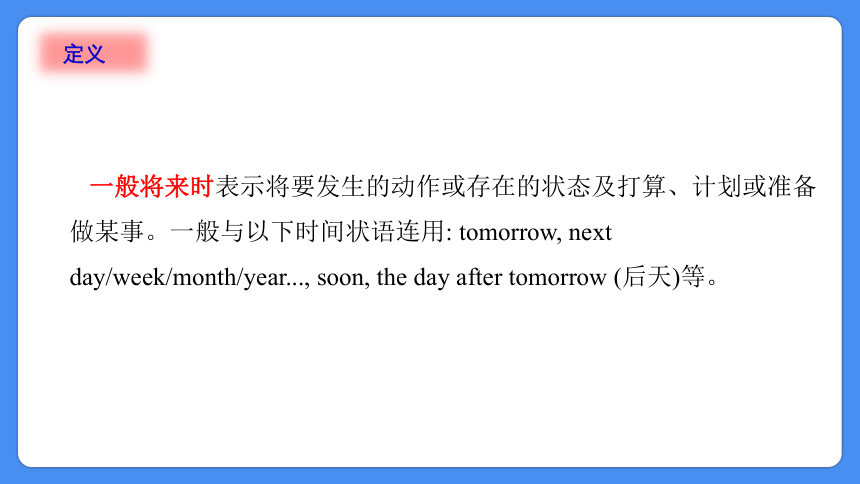
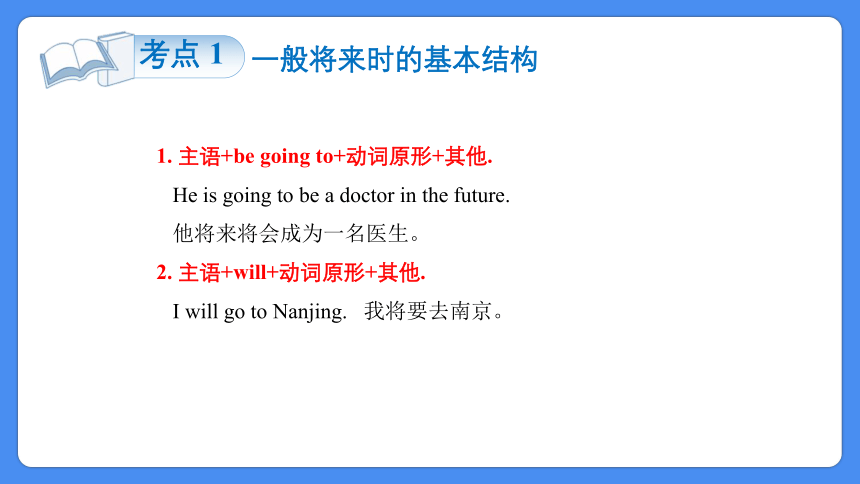
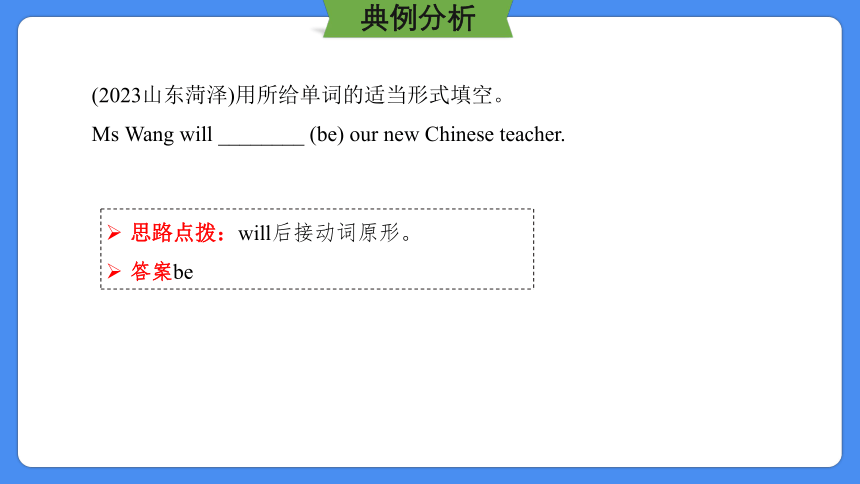
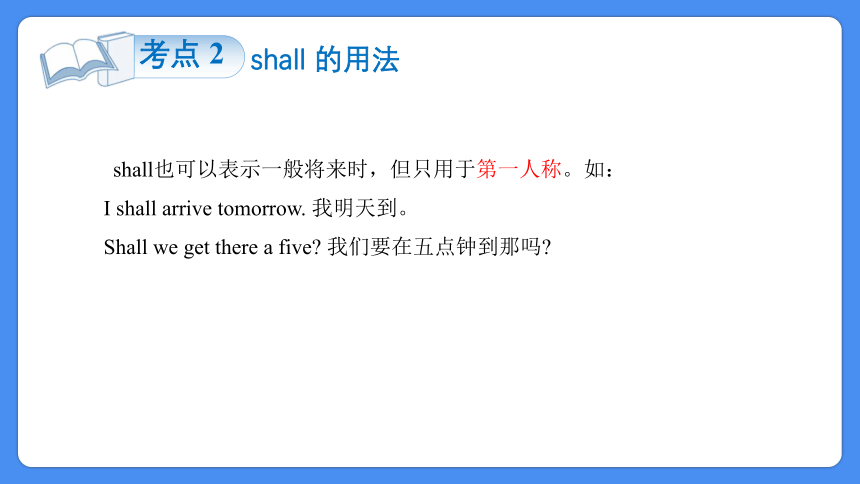
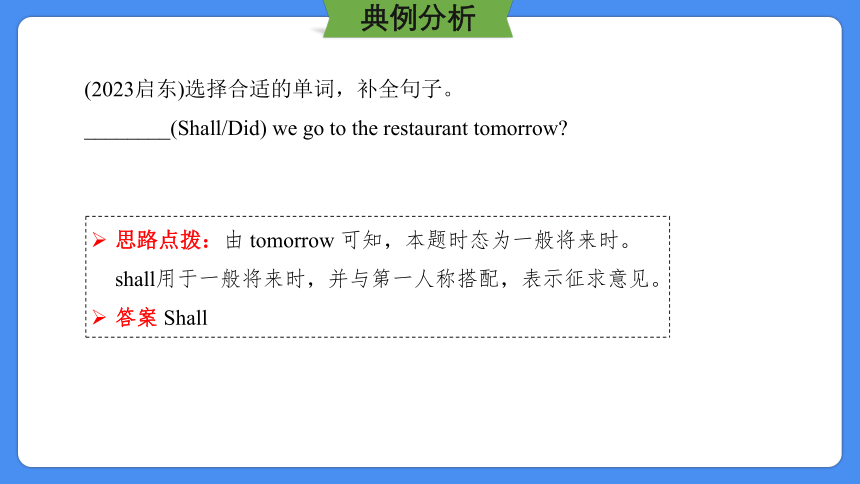
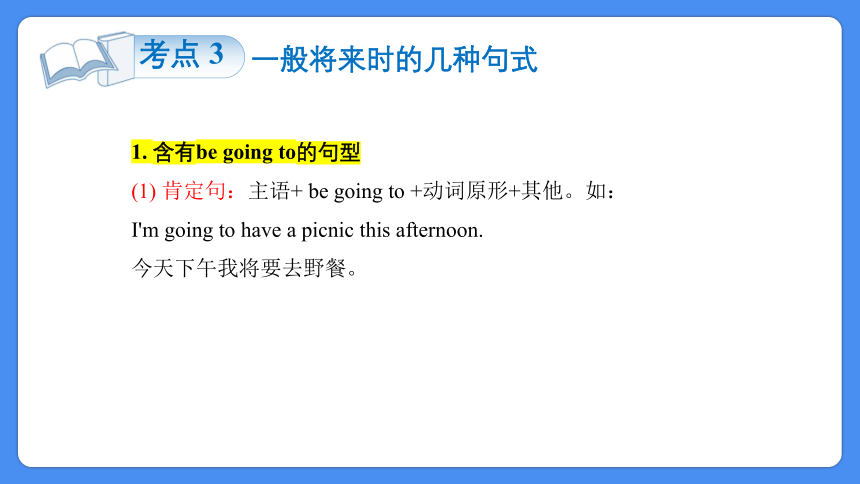
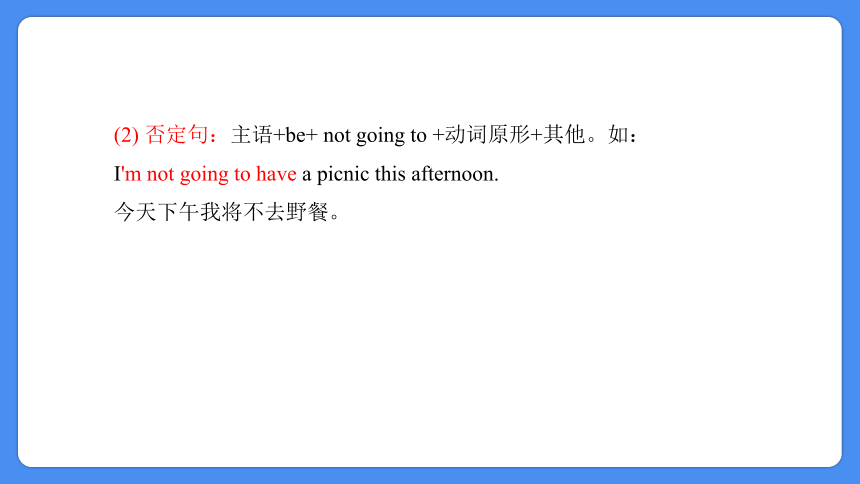
文档简介
(共21张PPT)
第十二讲 一般将来时授课人:小升初英语专题复习知识导图
一般将来时表示将要发生的动作或存在的状态及打算、计划或准备做某事。一般与以下时间状语连用: tomorrow, next day/week/month/year..., soon, the day after tomorrow (后天)等。
定义
一般将来时的基本结构
考点 1
1. 主语+be going to+动词原形+其他.
He is going to be a doctor in the future.
他将来将会成为一名医生。
2. 主语+will+动词原形+其他.
I will go to Nanjing. 我将要去南京。
典例分析
(2023山东菏泽)用所给单词的适当形式填空。
Ms Wang will ________ (be) our new Chinese teacher.
思路点拨:will后接动词原形。
答案be
shall 的用法
考点 2
shall也可以表示一般将来时,但只用于第一人称。如:
I shall arrive tomorrow. 我明天到。
Shall we get there a five 我们要在五点钟到那吗
典例分析
(2023启东)选择合适的单词,补全句子。
________(Shall/Did) we go to the restaurant tomorrow
思路点拨:由 tomorrow 可知,本题时态为一般将来时。shall用于一般将来时,并与第一人称搭配,表示征求意见。
答案 Shall
一般将来时的几种句式
考点 3
1. 含有be going to的句型
(1) 肯定句:主语+ be going to +动词原形+其他。如:
I'm going to have a picnic this afternoon.
今天下午我将要去野餐。
(2) 否定句:主语+be+ not going to +动词原形+其他。如:
I'm not going to have a picnic this afternoon.
今天下午我将不去野餐。
(3) 一般疑问句:Be +主语+ going to +动词原形+其他?
肯定回答:Yes, 主语+be.
否定回答:No, 主语+ be + not. 如:
例:I am going to have a picnic this afternoon. 我今天下午要去野餐。
(改为一般疑问句并作回答)
—Are you going to have a picnic this afternoon 你今天下午将要去野餐吗?
—Yes, I am. 是的,我要去。/—No, I’m not. 不,我不去。
(4) 特殊疑问句:特殊疑问词+一般疑问句?
What are you going to do tomorrow 你明天将要去做什么?
例:Sam is going to have a birthday party this Friday.
(对划线部分进行提问)
What is Sam going to have this Friday
2. 含有will的句型
(1) 肯定句:主语+ will +动词原形+其他。如:
I will play (play) football tomorrow. 我明天将要去踢足球。
(2) 否定句:主语+ won’t +动词原形+其他。如:
I won’t play (not play) football tomorrow. 我明天将不去踢足球。
温馨提示:will和not的缩写是won’t而不是willn’t。
(3) 一般疑问句:Will +主语+动词原形+其他?
肯定回答:Yes, 主语+will.
否定回答:No, 主语+won’t. 如:
例:I will play football tomorrow. 我明天将要去踢足球。
(改为一般疑问句并作回答)
—Will you play football tomorrow 你明天将要去踢球吗?
—Yes, I will. 是的,我会去。 /—No, I won’t. 不,我不去。
(4) 特殊疑问句:特殊疑问词+一般疑问句?如:
What will you do tomorrow 你明天将要做什么?
例:Lingling will go to the park next Sunday. (对划线部分进行提问)
What will Lingling do next Sunday 玲玲下周日将要去做什么?
温馨提示:在句型转换中如遇到第一人称的陈述句变为疑问句时,要把第一人称变成第二人称。如:
I am going to go to the zoo tomorrow.
变成一般疑问句为: Are you going to go to the zoo tomorrow
典例分析
按要求完成下列各题。
1.根据中文将句子补充完整。
我将要去吃午餐。
I ________________________have lunch.
2.用所给单词的适当形式填空。
We ________________________(not play) chess next week.
思路点拨:
1.根据题意是要在空白处填入“将要去”,be going to意为“将要,计划,准备”,表示近期、眼下就要发生的事情,一般指已经计划好的事情。因此正确答案是:am going to。
2.由next week可知此句是一般将来时,一般将来时否定句的结构有两种,一种是“主语+be动词+not+going to+动词原形+其他.”。由主语we可知此处的be动词用are。注意be going to是一个整体,不要漏掉其中任何一个单词。另一种是“主语+will not+动词原形+其他.”。所以此题答案是:are not going to play/will not play。
答案1.am going to 2.are not going to play/will not play
一、用所给单词的适当形式填空。
1. My brother __________________________(come) back next week.
2. Today is Sunday. We __________________________(have) a picnic this afternoon.
3. I ________(be) tired. I ____________________(go) to bed early tonight.
4. There are some clouds in the sky. It ________(rain) soon.
典例分析
will come/is going to come
will have/are going to have
am
will go/am going to go
will rain
二、单项选择。
( ) 1.________ you ________a teacher when you grow up
A. Will;to be B. Are;going to be C. Are;being D. Will;going to be
( ) 2. He ________ very busy this week. He ________ free next week.
A. will be;is B. is;is C. will be;will be D. is;will be
典例分析
B
D
( ) 3. Su Hai will ________Uncle Bob about our visit.
A. told B. telling C. tell D. be telling
( ) 4. There ________ a birthday party this Sunday.
A. shall be B. will be C. shall going to be D. will going to be
典例分析
C
B
授课人:Thank you!
第十二讲 一般将来时授课人:小升初英语专题复习知识导图
一般将来时表示将要发生的动作或存在的状态及打算、计划或准备做某事。一般与以下时间状语连用: tomorrow, next day/week/month/year..., soon, the day after tomorrow (后天)等。
定义
一般将来时的基本结构
考点 1
1. 主语+be going to+动词原形+其他.
He is going to be a doctor in the future.
他将来将会成为一名医生。
2. 主语+will+动词原形+其他.
I will go to Nanjing. 我将要去南京。
典例分析
(2023山东菏泽)用所给单词的适当形式填空。
Ms Wang will ________ (be) our new Chinese teacher.
思路点拨:will后接动词原形。
答案be
shall 的用法
考点 2
shall也可以表示一般将来时,但只用于第一人称。如:
I shall arrive tomorrow. 我明天到。
Shall we get there a five 我们要在五点钟到那吗
典例分析
(2023启东)选择合适的单词,补全句子。
________(Shall/Did) we go to the restaurant tomorrow
思路点拨:由 tomorrow 可知,本题时态为一般将来时。shall用于一般将来时,并与第一人称搭配,表示征求意见。
答案 Shall
一般将来时的几种句式
考点 3
1. 含有be going to的句型
(1) 肯定句:主语+ be going to +动词原形+其他。如:
I'm going to have a picnic this afternoon.
今天下午我将要去野餐。
(2) 否定句:主语+be+ not going to +动词原形+其他。如:
I'm not going to have a picnic this afternoon.
今天下午我将不去野餐。
(3) 一般疑问句:Be +主语+ going to +动词原形+其他?
肯定回答:Yes, 主语+be.
否定回答:No, 主语+ be + not. 如:
例:I am going to have a picnic this afternoon. 我今天下午要去野餐。
(改为一般疑问句并作回答)
—Are you going to have a picnic this afternoon 你今天下午将要去野餐吗?
—Yes, I am. 是的,我要去。/—No, I’m not. 不,我不去。
(4) 特殊疑问句:特殊疑问词+一般疑问句?
What are you going to do tomorrow 你明天将要去做什么?
例:Sam is going to have a birthday party this Friday.
(对划线部分进行提问)
What is Sam going to have this Friday
2. 含有will的句型
(1) 肯定句:主语+ will +动词原形+其他。如:
I will play (play) football tomorrow. 我明天将要去踢足球。
(2) 否定句:主语+ won’t +动词原形+其他。如:
I won’t play (not play) football tomorrow. 我明天将不去踢足球。
温馨提示:will和not的缩写是won’t而不是willn’t。
(3) 一般疑问句:Will +主语+动词原形+其他?
肯定回答:Yes, 主语+will.
否定回答:No, 主语+won’t. 如:
例:I will play football tomorrow. 我明天将要去踢足球。
(改为一般疑问句并作回答)
—Will you play football tomorrow 你明天将要去踢球吗?
—Yes, I will. 是的,我会去。 /—No, I won’t. 不,我不去。
(4) 特殊疑问句:特殊疑问词+一般疑问句?如:
What will you do tomorrow 你明天将要做什么?
例:Lingling will go to the park next Sunday. (对划线部分进行提问)
What will Lingling do next Sunday 玲玲下周日将要去做什么?
温馨提示:在句型转换中如遇到第一人称的陈述句变为疑问句时,要把第一人称变成第二人称。如:
I am going to go to the zoo tomorrow.
变成一般疑问句为: Are you going to go to the zoo tomorrow
典例分析
按要求完成下列各题。
1.根据中文将句子补充完整。
我将要去吃午餐。
I ________________________have lunch.
2.用所给单词的适当形式填空。
We ________________________(not play) chess next week.
思路点拨:
1.根据题意是要在空白处填入“将要去”,be going to意为“将要,计划,准备”,表示近期、眼下就要发生的事情,一般指已经计划好的事情。因此正确答案是:am going to。
2.由next week可知此句是一般将来时,一般将来时否定句的结构有两种,一种是“主语+be动词+not+going to+动词原形+其他.”。由主语we可知此处的be动词用are。注意be going to是一个整体,不要漏掉其中任何一个单词。另一种是“主语+will not+动词原形+其他.”。所以此题答案是:are not going to play/will not play。
答案1.am going to 2.are not going to play/will not play
一、用所给单词的适当形式填空。
1. My brother __________________________(come) back next week.
2. Today is Sunday. We __________________________(have) a picnic this afternoon.
3. I ________(be) tired. I ____________________(go) to bed early tonight.
4. There are some clouds in the sky. It ________(rain) soon.
典例分析
will come/is going to come
will have/are going to have
am
will go/am going to go
will rain
二、单项选择。
( ) 1.________ you ________a teacher when you grow up
A. Will;to be B. Are;going to be C. Are;being D. Will;going to be
( ) 2. He ________ very busy this week. He ________ free next week.
A. will be;is B. is;is C. will be;will be D. is;will be
典例分析
B
D
( ) 3. Su Hai will ________Uncle Bob about our visit.
A. told B. telling C. tell D. be telling
( ) 4. There ________ a birthday party this Sunday.
A. shall be B. will be C. shall going to be D. will going to be
典例分析
C
B
授课人:Thank you!
